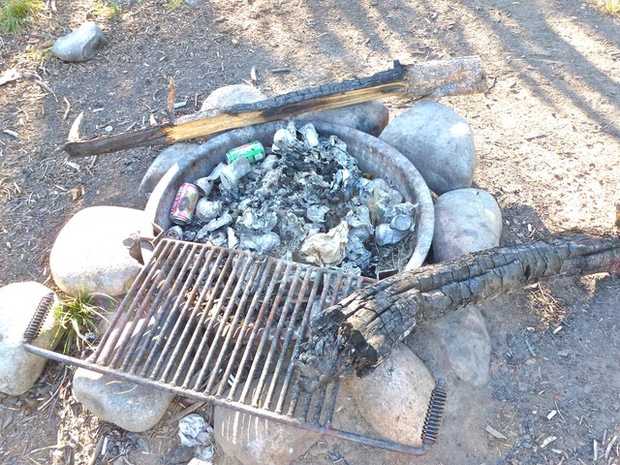It’s Not That Hard to ‘Leave no Trace’ When You Finish Camping
Idaho Outdoors 10.06.12

Don’t use fire rings for trash. They become a mess. The campfire ring along the Salmon River near Stanley, Idaho was littered with pop cans, foil and other garbage left by a previous camper.
It was the first thing I spotted when I set up camp this summer in the undeveloped site near the Stanley Ranger Station. (I like the spot because it has cell service.)
Apparently, the previous camper thought the aluminum cans in the fire ring would disintegrate in time.
Let’s see, some experts believe it takes 80 to 100 years. That’s a lot of years for the cans to be in the campfire ring. However, responsible campers always come along and clean up messes like this one along the river.
Trash lasts a long time in the woods. A display at the Lolo Visitor Center off U.S. 12 has some pretty startling figures on how long garbage can last: plastic bottles, more than 500 years; plastic six-pack rings, 450 years; paper plates, 4 months; glass bottles, a million years (wow, really?); and styrofoam, forever.
After years of camping, I continue to see a lot of the same problems — unburied toilet paper and human waste, discarded disposable diapers, ugly fire rings littered with garbage, chopped green trees, food at campground water pumps where someone did the dishes, and trashed outhouses.
It’s kind of discouraging. The litter, and vandalism, too, continue. The locks on one outhouse were broken after being pounded for no reason.
Anyway, I was recently emailed some Leave No Trace rules for backpacking, river trips and wilderness treks. But the organization also suggests proper ways to camp in campgrounds. I checked them out and added a few of my own ideas. Here they are:
- Many designated campsites offer tent pads or other areas that are suited for tents. Use these areas. Don’t pitch a tent on untouched vegetation.
- If no designated tent sites are available, choose for your tent site and kitchen site the most durable surface available, like gravel, bare ground or rock.
- Consider putting a tarp down in your kitchen area to catch food and trash, which can then be easily put into the trash. River outfitting stores offer a mat that fits the bill.
- When traveling around a campground, like to and from the outhouse or water pump, use established paths. Don’t break a new trail and stomp vegetation.
- If trash cans are available, use them. If not, take your trash home. Set up trash bags for garbage, recycling and compost. Yes, you can take your compost home to the garden.
- Don’t burn trash in the campfire. If you can get a campfire big and hot enough to burn cans, it’s way too big and presents a safety hazard.
- Use the outhouse. If you don’t want to go the distance to the outhouse from your camp, set up a porta potty and porta potty tent in your campsite. It’s easy and convenient.
If you are camping in an undeveloped camping area, use a porta potty to avoid a whole bunch of cat holes all over the place. After a weekend of camping, dump the contents at an RV dump station. Porta potties are easy to use and cost between $70 and $110.
- Pick up after your pet. Use biodegradable pet poop bags. Put the bags in the trash or pack them to the nearest trash bin or your home.
- Leave a campsite cleaner than you found it. It will be appreciated and will set a good example for the next camper.
- Be careful with fire. We’ve learned of the mass destruction of forest fires this summer.
Better yet, cook your meals on a camp stove. It’s much easier and your clothing won’t smell like smoke.
If you need a campfire, make it small.
- Don’t gather firewood in a campground. It’s probably not allowed.
- Respect critters. Keep your food and trash secure so you don’t attract animals to a campsite.
- Don’t feed wildlife, because it fosters bad habits.
- Be considerate of other campers by adhering to campground rules, keeping your pet under control and not making a lot of noise. Just be a good neighbor.
Good camping this fall, and let’s leave campgrounds cleaner than we found them.
Reach Pete Zimowsky at 377-6445, Twitter: @Zimosoutdoors.
Statesman outdoor writer Pete Zimowsky writes a column every other Sunday.

